Nursing Assignment 1: Mental Health, Depression and Suicide Report
VerifiedAdded on 2022/10/02
|7
|1877
|272
Report
AI Summary
This report, a nursing assignment, delves into the critical issues of depression and suicide within the Aboriginal and Torres Strait Islander communities in Australia. It explores the various causes contributing to these challenges, including stressful life events, interpersonal conflicts, economic disparities, and the impact of historical and social factors. The report highlights the significance of mental health, emphasizing the need for culturally competent healthcare approaches and the implementation of preventive measures. It examines the role of healthcare professionals, including GPs and allied health services, in managing mental health issues and suicide prevention. Furthermore, the report discusses the importance of government initiatives and community-based programs, such as the ACCHO group and Allied Psychological Service Program, in promoting mental well-being and reducing suicide rates. The report concludes by summarizing the key findings and emphasizing the necessity for a holistic approach that addresses cultural, social, and economic factors to improve mental health outcomes within these communities. The report also includes a comprehensive list of references that support the findings and arguments presented.
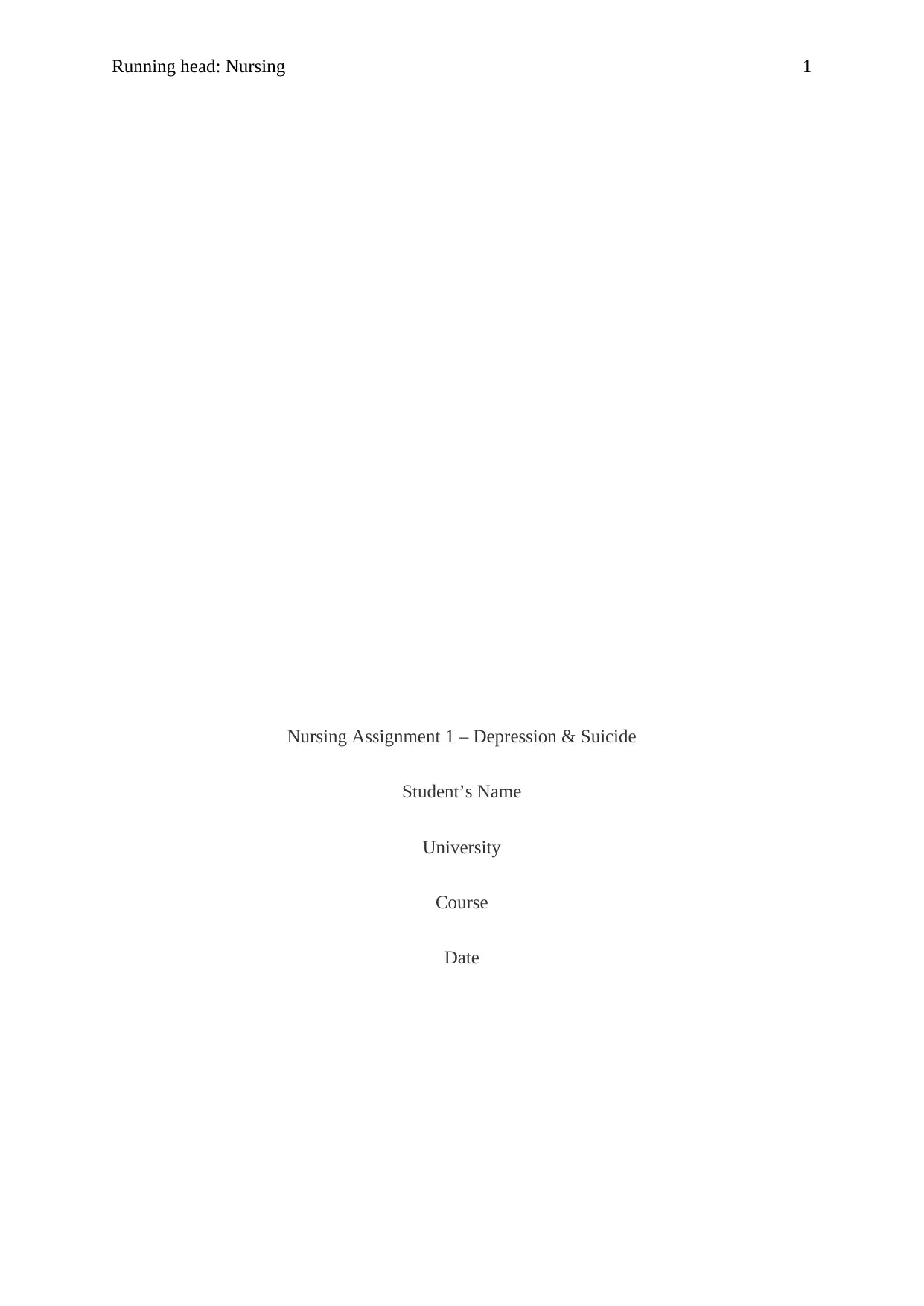
Running head: Nursing 1
Nursing Assignment 1 – Depression & Suicide
Student’s Name
University
Course
Date
Nursing Assignment 1 – Depression & Suicide
Student’s Name
University
Course
Date
Paraphrase This Document
Need a fresh take? Get an instant paraphrase of this document with our AI Paraphraser
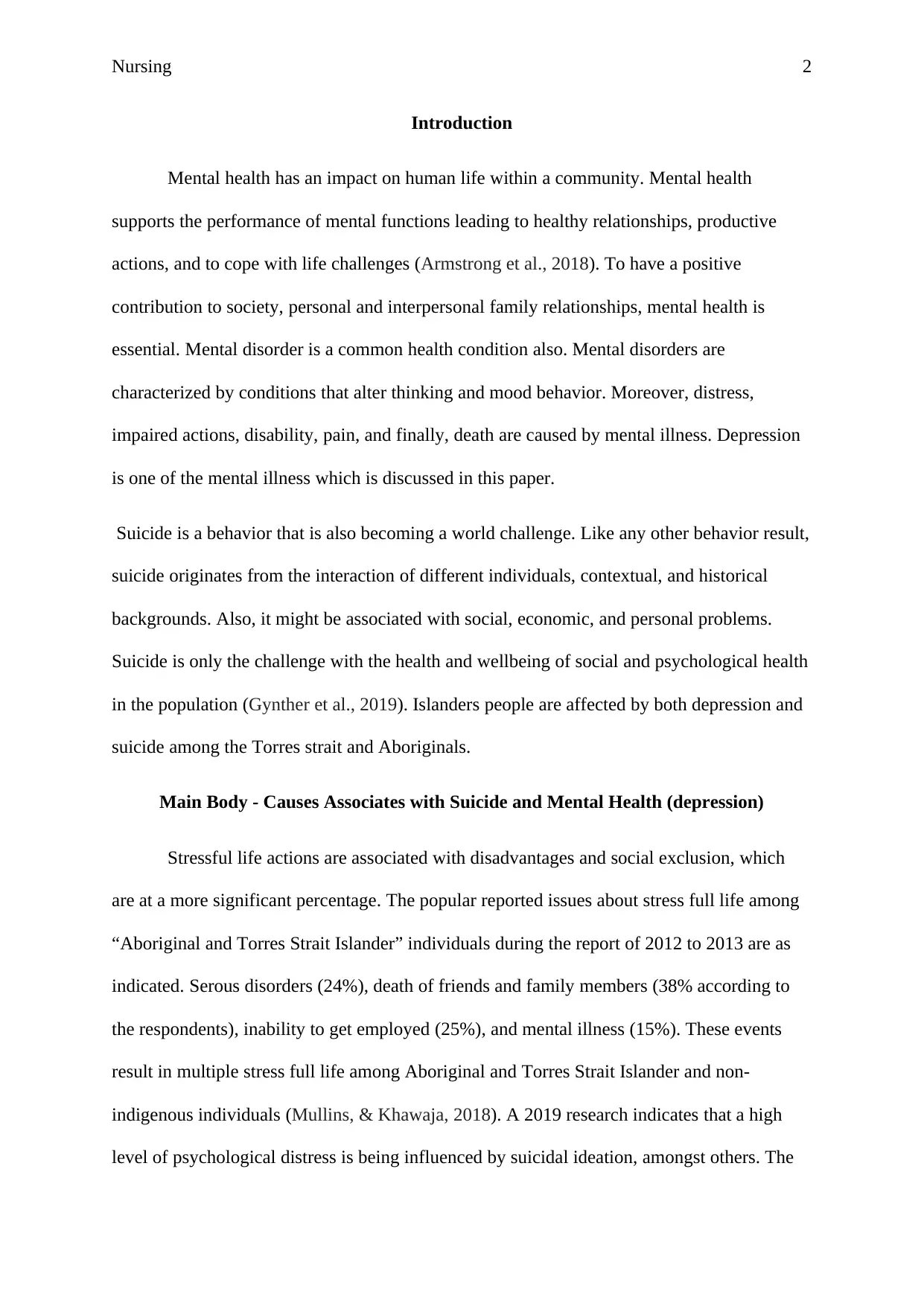
Nursing 2
Introduction
Mental health has an impact on human life within a community. Mental health
supports the performance of mental functions leading to healthy relationships, productive
actions, and to cope with life challenges (Armstrong et al., 2018). To have a positive
contribution to society, personal and interpersonal family relationships, mental health is
essential. Mental disorder is a common health condition also. Mental disorders are
characterized by conditions that alter thinking and mood behavior. Moreover, distress,
impaired actions, disability, pain, and finally, death are caused by mental illness. Depression
is one of the mental illness which is discussed in this paper.
Suicide is a behavior that is also becoming a world challenge. Like any other behavior result,
suicide originates from the interaction of different individuals, contextual, and historical
backgrounds. Also, it might be associated with social, economic, and personal problems.
Suicide is only the challenge with the health and wellbeing of social and psychological health
in the population (Gynther et al., 2019). Islanders people are affected by both depression and
suicide among the Torres strait and Aboriginals.
Main Body - Causes Associates with Suicide and Mental Health (depression)
Stressful life actions are associated with disadvantages and social exclusion, which
are at a more significant percentage. The popular reported issues about stress full life among
“Aboriginal and Torres Strait Islander” individuals during the report of 2012 to 2013 are as
indicated. Serous disorders (24%), death of friends and family members (38% according to
the respondents), inability to get employed (25%), and mental illness (15%). These events
result in multiple stress full life among Aboriginal and Torres Strait Islander and non-
indigenous individuals (Mullins, & Khawaja, 2018). A 2019 research indicates that a high
level of psychological distress is being influenced by suicidal ideation, amongst others. The
Introduction
Mental health has an impact on human life within a community. Mental health
supports the performance of mental functions leading to healthy relationships, productive
actions, and to cope with life challenges (Armstrong et al., 2018). To have a positive
contribution to society, personal and interpersonal family relationships, mental health is
essential. Mental disorder is a common health condition also. Mental disorders are
characterized by conditions that alter thinking and mood behavior. Moreover, distress,
impaired actions, disability, pain, and finally, death are caused by mental illness. Depression
is one of the mental illness which is discussed in this paper.
Suicide is a behavior that is also becoming a world challenge. Like any other behavior result,
suicide originates from the interaction of different individuals, contextual, and historical
backgrounds. Also, it might be associated with social, economic, and personal problems.
Suicide is only the challenge with the health and wellbeing of social and psychological health
in the population (Gynther et al., 2019). Islanders people are affected by both depression and
suicide among the Torres strait and Aboriginals.
Main Body - Causes Associates with Suicide and Mental Health (depression)
Stressful life actions are associated with disadvantages and social exclusion, which
are at a more significant percentage. The popular reported issues about stress full life among
“Aboriginal and Torres Strait Islander” individuals during the report of 2012 to 2013 are as
indicated. Serous disorders (24%), death of friends and family members (38% according to
the respondents), inability to get employed (25%), and mental illness (15%). These events
result in multiple stress full life among Aboriginal and Torres Strait Islander and non-
indigenous individuals (Mullins, & Khawaja, 2018). A 2019 research indicates that a high
level of psychological distress is being influenced by suicidal ideation, amongst others. The
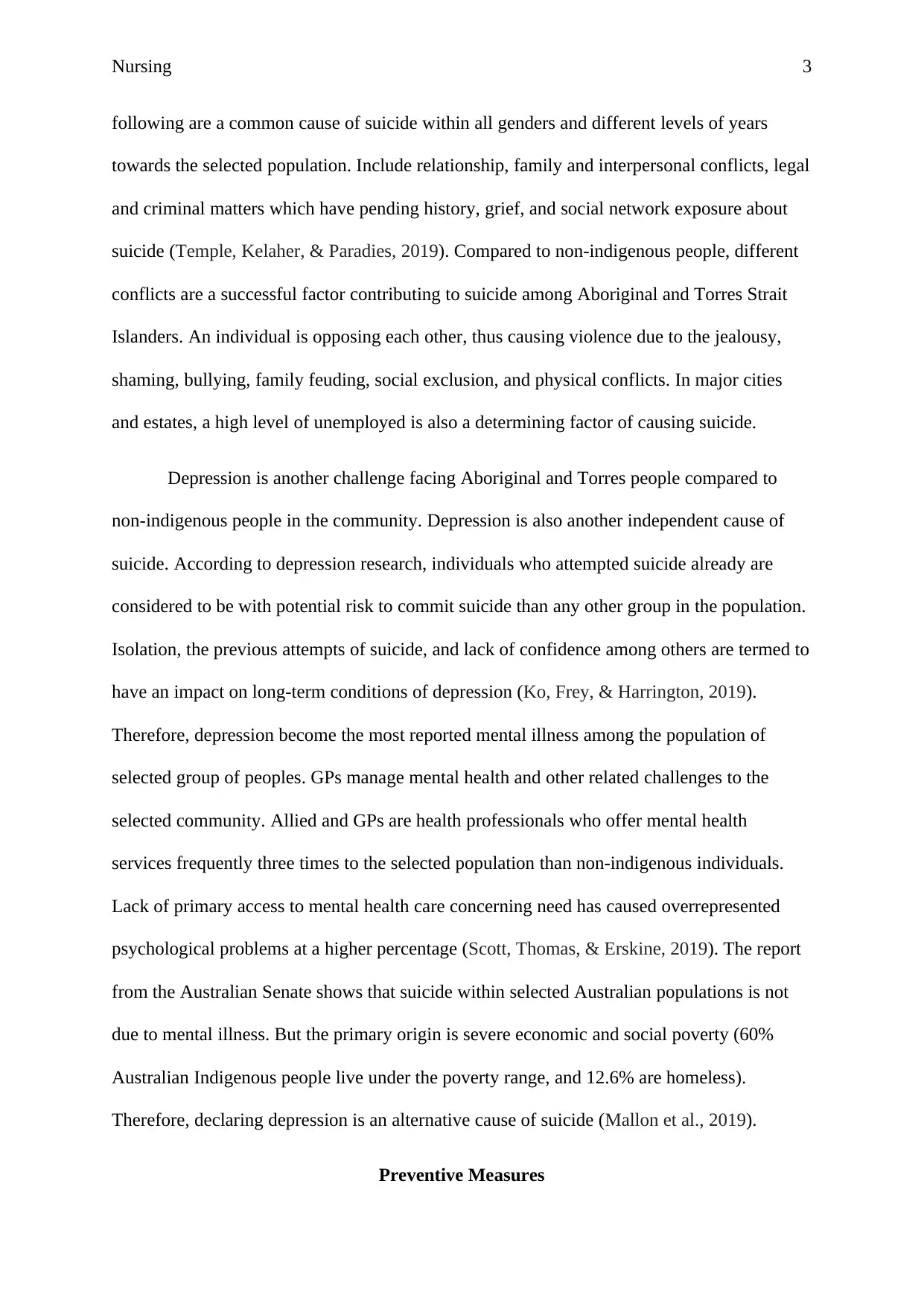
Nursing 3
following are a common cause of suicide within all genders and different levels of years
towards the selected population. Include relationship, family and interpersonal conflicts, legal
and criminal matters which have pending history, grief, and social network exposure about
suicide (Temple, Kelaher, & Paradies, 2019). Compared to non-indigenous people, different
conflicts are a successful factor contributing to suicide among Aboriginal and Torres Strait
Islanders. An individual is opposing each other, thus causing violence due to the jealousy,
shaming, bullying, family feuding, social exclusion, and physical conflicts. In major cities
and estates, a high level of unemployed is also a determining factor of causing suicide.
Depression is another challenge facing Aboriginal and Torres people compared to
non-indigenous people in the community. Depression is also another independent cause of
suicide. According to depression research, individuals who attempted suicide already are
considered to be with potential risk to commit suicide than any other group in the population.
Isolation, the previous attempts of suicide, and lack of confidence among others are termed to
have an impact on long-term conditions of depression (Ko, Frey, & Harrington, 2019).
Therefore, depression become the most reported mental illness among the population of
selected group of peoples. GPs manage mental health and other related challenges to the
selected community. Allied and GPs are health professionals who offer mental health
services frequently three times to the selected population than non-indigenous individuals.
Lack of primary access to mental health care concerning need has caused overrepresented
psychological problems at a higher percentage (Scott, Thomas, & Erskine, 2019). The report
from the Australian Senate shows that suicide within selected Australian populations is not
due to mental illness. But the primary origin is severe economic and social poverty (60%
Australian Indigenous people live under the poverty range, and 12.6% are homeless).
Therefore, declaring depression is an alternative cause of suicide (Mallon et al., 2019).
Preventive Measures
following are a common cause of suicide within all genders and different levels of years
towards the selected population. Include relationship, family and interpersonal conflicts, legal
and criminal matters which have pending history, grief, and social network exposure about
suicide (Temple, Kelaher, & Paradies, 2019). Compared to non-indigenous people, different
conflicts are a successful factor contributing to suicide among Aboriginal and Torres Strait
Islanders. An individual is opposing each other, thus causing violence due to the jealousy,
shaming, bullying, family feuding, social exclusion, and physical conflicts. In major cities
and estates, a high level of unemployed is also a determining factor of causing suicide.
Depression is another challenge facing Aboriginal and Torres people compared to
non-indigenous people in the community. Depression is also another independent cause of
suicide. According to depression research, individuals who attempted suicide already are
considered to be with potential risk to commit suicide than any other group in the population.
Isolation, the previous attempts of suicide, and lack of confidence among others are termed to
have an impact on long-term conditions of depression (Ko, Frey, & Harrington, 2019).
Therefore, depression become the most reported mental illness among the population of
selected group of peoples. GPs manage mental health and other related challenges to the
selected community. Allied and GPs are health professionals who offer mental health
services frequently three times to the selected population than non-indigenous individuals.
Lack of primary access to mental health care concerning need has caused overrepresented
psychological problems at a higher percentage (Scott, Thomas, & Erskine, 2019). The report
from the Australian Senate shows that suicide within selected Australian populations is not
due to mental illness. But the primary origin is severe economic and social poverty (60%
Australian Indigenous people live under the poverty range, and 12.6% are homeless).
Therefore, declaring depression is an alternative cause of suicide (Mallon et al., 2019).
Preventive Measures
⊘ This is a preview!⊘
Do you want full access?
Subscribe today to unlock all pages.

Trusted by 1+ million students worldwide
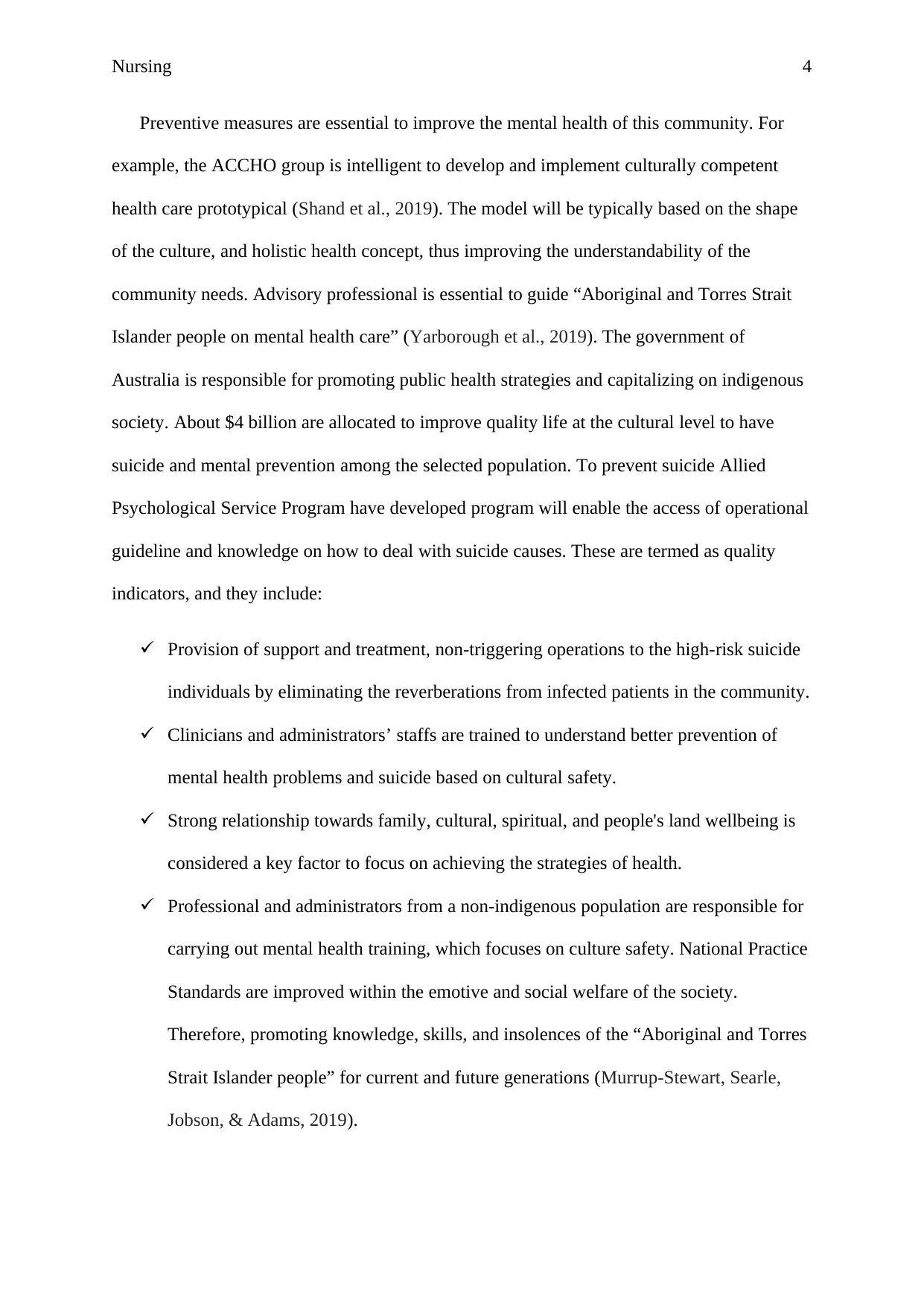
Nursing 4
Preventive measures are essential to improve the mental health of this community. For
example, the ACCHO group is intelligent to develop and implement culturally competent
health care prototypical (Shand et al., 2019). The model will be typically based on the shape
of the culture, and holistic health concept, thus improving the understandability of the
community needs. Advisory professional is essential to guide “Aboriginal and Torres Strait
Islander people on mental health care” (Yarborough et al., 2019). The government of
Australia is responsible for promoting public health strategies and capitalizing on indigenous
society. About $4 billion are allocated to improve quality life at the cultural level to have
suicide and mental prevention among the selected population. To prevent suicide Allied
Psychological Service Program have developed program will enable the access of operational
guideline and knowledge on how to deal with suicide causes. These are termed as quality
indicators, and they include:
Provision of support and treatment, non-triggering operations to the high-risk suicide
individuals by eliminating the reverberations from infected patients in the community.
Clinicians and administrators’ staffs are trained to understand better prevention of
mental health problems and suicide based on cultural safety.
Strong relationship towards family, cultural, spiritual, and people's land wellbeing is
considered a key factor to focus on achieving the strategies of health.
Professional and administrators from a non-indigenous population are responsible for
carrying out mental health training, which focuses on culture safety. National Practice
Standards are improved within the emotive and social welfare of the society.
Therefore, promoting knowledge, skills, and insolences of the “Aboriginal and Torres
Strait Islander people” for current and future generations (Murrup‐Stewart, Searle,
Jobson, & Adams, 2019).
Preventive measures are essential to improve the mental health of this community. For
example, the ACCHO group is intelligent to develop and implement culturally competent
health care prototypical (Shand et al., 2019). The model will be typically based on the shape
of the culture, and holistic health concept, thus improving the understandability of the
community needs. Advisory professional is essential to guide “Aboriginal and Torres Strait
Islander people on mental health care” (Yarborough et al., 2019). The government of
Australia is responsible for promoting public health strategies and capitalizing on indigenous
society. About $4 billion are allocated to improve quality life at the cultural level to have
suicide and mental prevention among the selected population. To prevent suicide Allied
Psychological Service Program have developed program will enable the access of operational
guideline and knowledge on how to deal with suicide causes. These are termed as quality
indicators, and they include:
Provision of support and treatment, non-triggering operations to the high-risk suicide
individuals by eliminating the reverberations from infected patients in the community.
Clinicians and administrators’ staffs are trained to understand better prevention of
mental health problems and suicide based on cultural safety.
Strong relationship towards family, cultural, spiritual, and people's land wellbeing is
considered a key factor to focus on achieving the strategies of health.
Professional and administrators from a non-indigenous population are responsible for
carrying out mental health training, which focuses on culture safety. National Practice
Standards are improved within the emotive and social welfare of the society.
Therefore, promoting knowledge, skills, and insolences of the “Aboriginal and Torres
Strait Islander people” for current and future generations (Murrup‐Stewart, Searle,
Jobson, & Adams, 2019).
Paraphrase This Document
Need a fresh take? Get an instant paraphrase of this document with our AI Paraphraser
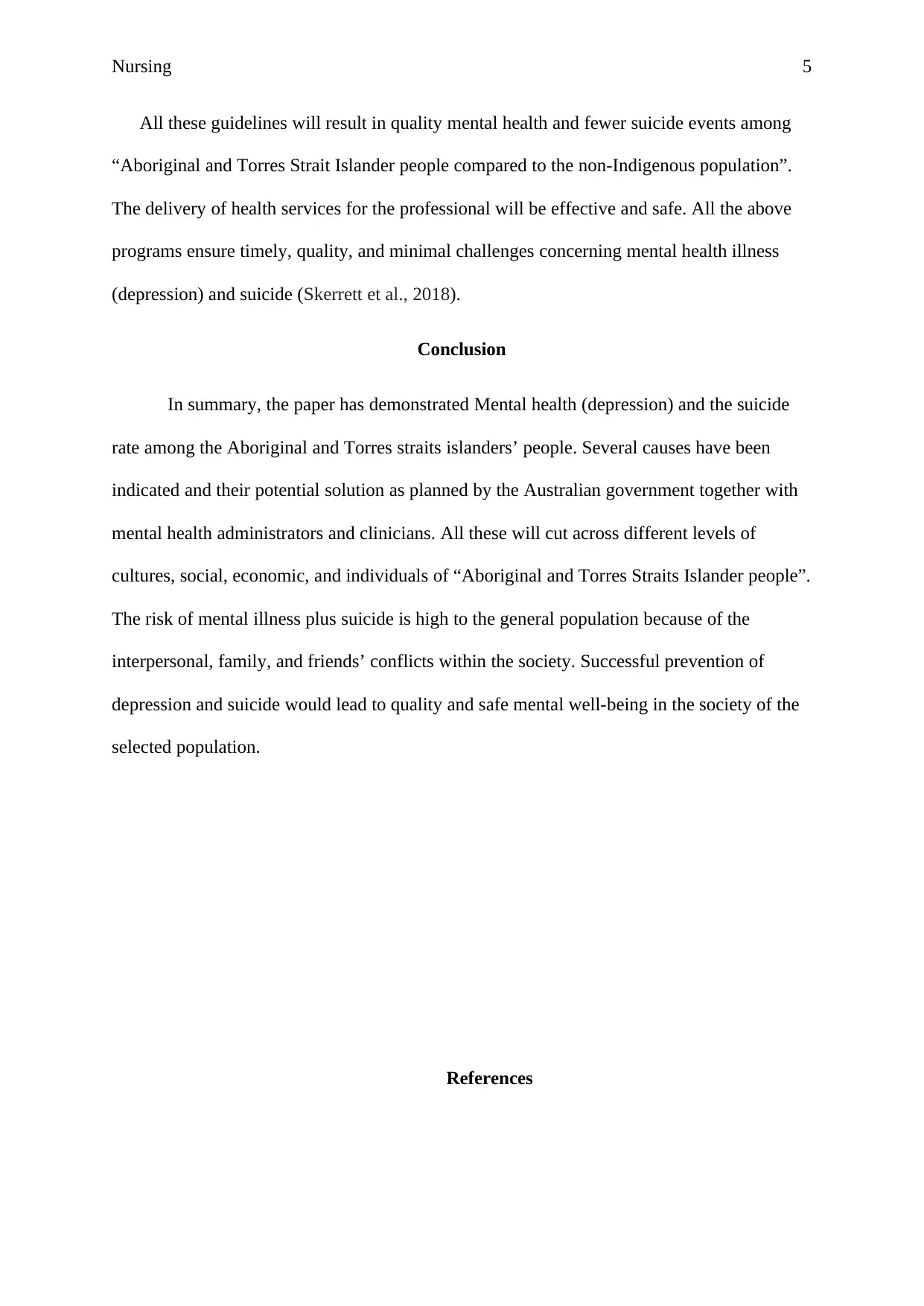
Nursing 5
All these guidelines will result in quality mental health and fewer suicide events among
“Aboriginal and Torres Strait Islander people compared to the non-Indigenous population”.
The delivery of health services for the professional will be effective and safe. All the above
programs ensure timely, quality, and minimal challenges concerning mental health illness
(depression) and suicide (Skerrett et al., 2018).
Conclusion
In summary, the paper has demonstrated Mental health (depression) and the suicide
rate among the Aboriginal and Torres straits islanders’ people. Several causes have been
indicated and their potential solution as planned by the Australian government together with
mental health administrators and clinicians. All these will cut across different levels of
cultures, social, economic, and individuals of “Aboriginal and Torres Straits Islander people”.
The risk of mental illness plus suicide is high to the general population because of the
interpersonal, family, and friends’ conflicts within the society. Successful prevention of
depression and suicide would lead to quality and safe mental well-being in the society of the
selected population.
References
All these guidelines will result in quality mental health and fewer suicide events among
“Aboriginal and Torres Strait Islander people compared to the non-Indigenous population”.
The delivery of health services for the professional will be effective and safe. All the above
programs ensure timely, quality, and minimal challenges concerning mental health illness
(depression) and suicide (Skerrett et al., 2018).
Conclusion
In summary, the paper has demonstrated Mental health (depression) and the suicide
rate among the Aboriginal and Torres straits islanders’ people. Several causes have been
indicated and their potential solution as planned by the Australian government together with
mental health administrators and clinicians. All these will cut across different levels of
cultures, social, economic, and individuals of “Aboriginal and Torres Straits Islander people”.
The risk of mental illness plus suicide is high to the general population because of the
interpersonal, family, and friends’ conflicts within the society. Successful prevention of
depression and suicide would lead to quality and safe mental well-being in the society of the
selected population.
References
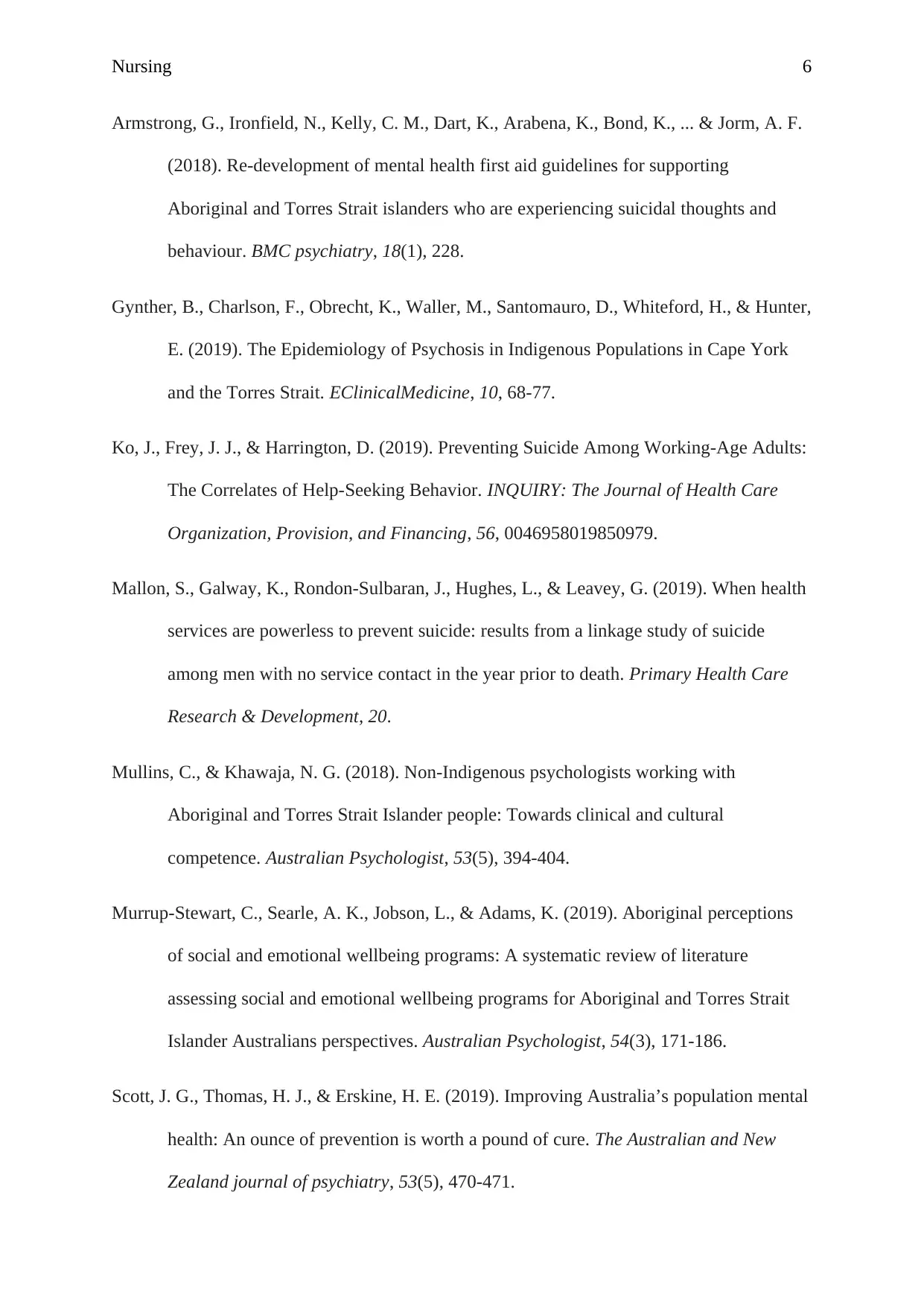
Nursing 6
Armstrong, G., Ironfield, N., Kelly, C. M., Dart, K., Arabena, K., Bond, K., ... & Jorm, A. F.
(2018). Re-development of mental health first aid guidelines for supporting
Aboriginal and Torres Strait islanders who are experiencing suicidal thoughts and
behaviour. BMC psychiatry, 18(1), 228.
Gynther, B., Charlson, F., Obrecht, K., Waller, M., Santomauro, D., Whiteford, H., & Hunter,
E. (2019). The Epidemiology of Psychosis in Indigenous Populations in Cape York
and the Torres Strait. EClinicalMedicine, 10, 68-77.
Ko, J., Frey, J. J., & Harrington, D. (2019). Preventing Suicide Among Working-Age Adults:
The Correlates of Help-Seeking Behavior. INQUIRY: The Journal of Health Care
Organization, Provision, and Financing, 56, 0046958019850979.
Mallon, S., Galway, K., Rondon-Sulbaran, J., Hughes, L., & Leavey, G. (2019). When health
services are powerless to prevent suicide: results from a linkage study of suicide
among men with no service contact in the year prior to death. Primary Health Care
Research & Development, 20.
Mullins, C., & Khawaja, N. G. (2018). Non‐Indigenous psychologists working with
Aboriginal and Torres Strait Islander people: Towards clinical and cultural
competence. Australian Psychologist, 53(5), 394-404.
Murrup‐Stewart, C., Searle, A. K., Jobson, L., & Adams, K. (2019). Aboriginal perceptions
of social and emotional wellbeing programs: A systematic review of literature
assessing social and emotional wellbeing programs for Aboriginal and Torres Strait
Islander Australians perspectives. Australian Psychologist, 54(3), 171-186.
Scott, J. G., Thomas, H. J., & Erskine, H. E. (2019). Improving Australia’s population mental
health: An ounce of prevention is worth a pound of cure. The Australian and New
Zealand journal of psychiatry, 53(5), 470-471.
Armstrong, G., Ironfield, N., Kelly, C. M., Dart, K., Arabena, K., Bond, K., ... & Jorm, A. F.
(2018). Re-development of mental health first aid guidelines for supporting
Aboriginal and Torres Strait islanders who are experiencing suicidal thoughts and
behaviour. BMC psychiatry, 18(1), 228.
Gynther, B., Charlson, F., Obrecht, K., Waller, M., Santomauro, D., Whiteford, H., & Hunter,
E. (2019). The Epidemiology of Psychosis in Indigenous Populations in Cape York
and the Torres Strait. EClinicalMedicine, 10, 68-77.
Ko, J., Frey, J. J., & Harrington, D. (2019). Preventing Suicide Among Working-Age Adults:
The Correlates of Help-Seeking Behavior. INQUIRY: The Journal of Health Care
Organization, Provision, and Financing, 56, 0046958019850979.
Mallon, S., Galway, K., Rondon-Sulbaran, J., Hughes, L., & Leavey, G. (2019). When health
services are powerless to prevent suicide: results from a linkage study of suicide
among men with no service contact in the year prior to death. Primary Health Care
Research & Development, 20.
Mullins, C., & Khawaja, N. G. (2018). Non‐Indigenous psychologists working with
Aboriginal and Torres Strait Islander people: Towards clinical and cultural
competence. Australian Psychologist, 53(5), 394-404.
Murrup‐Stewart, C., Searle, A. K., Jobson, L., & Adams, K. (2019). Aboriginal perceptions
of social and emotional wellbeing programs: A systematic review of literature
assessing social and emotional wellbeing programs for Aboriginal and Torres Strait
Islander Australians perspectives. Australian Psychologist, 54(3), 171-186.
Scott, J. G., Thomas, H. J., & Erskine, H. E. (2019). Improving Australia’s population mental
health: An ounce of prevention is worth a pound of cure. The Australian and New
Zealand journal of psychiatry, 53(5), 470-471.
⊘ This is a preview!⊘
Do you want full access?
Subscribe today to unlock all pages.

Trusted by 1+ million students worldwide
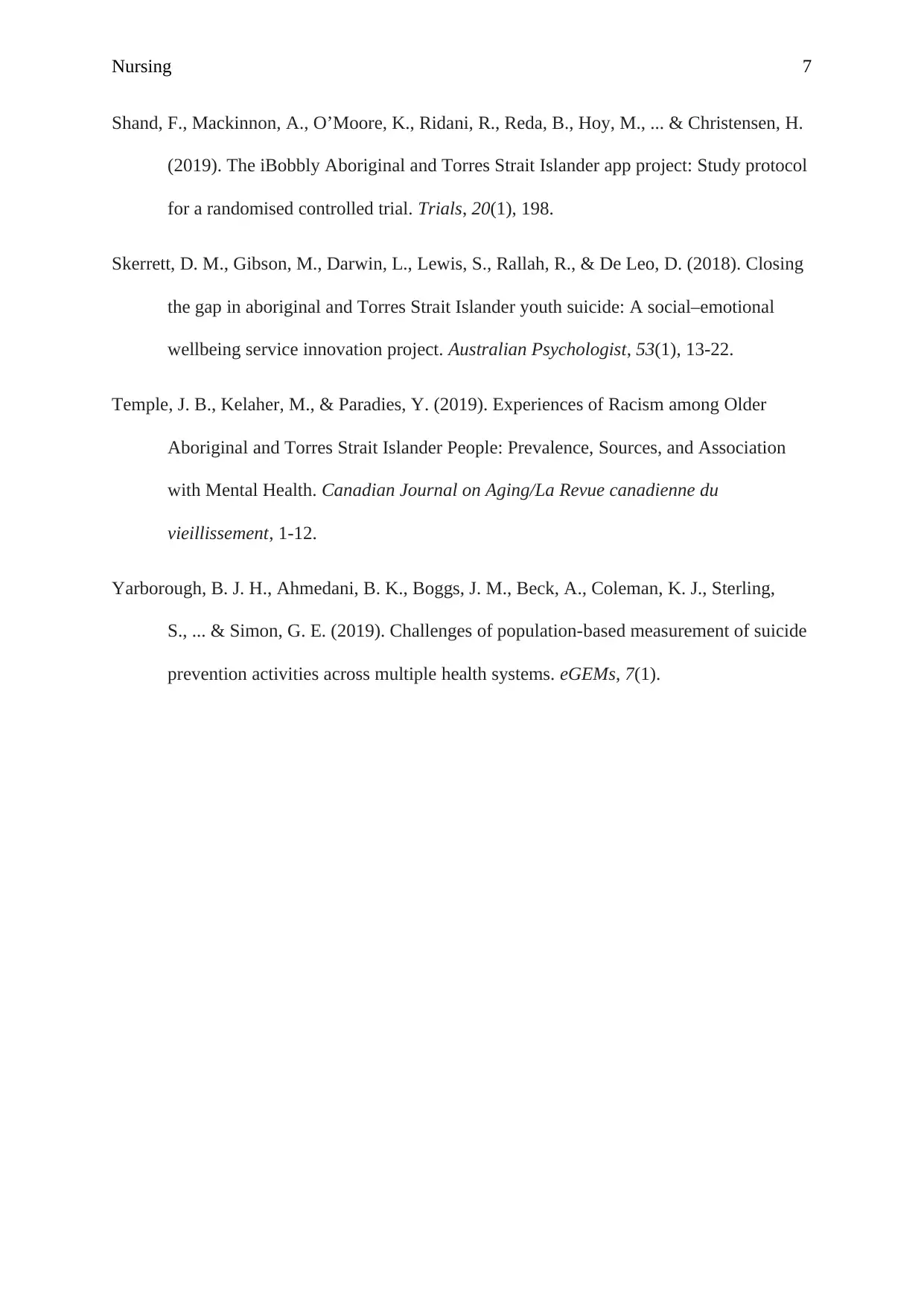
Nursing 7
Shand, F., Mackinnon, A., O’Moore, K., Ridani, R., Reda, B., Hoy, M., ... & Christensen, H.
(2019). The iBobbly Aboriginal and Torres Strait Islander app project: Study protocol
for a randomised controlled trial. Trials, 20(1), 198.
Skerrett, D. M., Gibson, M., Darwin, L., Lewis, S., Rallah, R., & De Leo, D. (2018). Closing
the gap in aboriginal and Torres Strait Islander youth suicide: A social–emotional
wellbeing service innovation project. Australian Psychologist, 53(1), 13-22.
Temple, J. B., Kelaher, M., & Paradies, Y. (2019). Experiences of Racism among Older
Aboriginal and Torres Strait Islander People: Prevalence, Sources, and Association
with Mental Health. Canadian Journal on Aging/La Revue canadienne du
vieillissement, 1-12.
Yarborough, B. J. H., Ahmedani, B. K., Boggs, J. M., Beck, A., Coleman, K. J., Sterling,
S., ... & Simon, G. E. (2019). Challenges of population-based measurement of suicide
prevention activities across multiple health systems. eGEMs, 7(1).
Shand, F., Mackinnon, A., O’Moore, K., Ridani, R., Reda, B., Hoy, M., ... & Christensen, H.
(2019). The iBobbly Aboriginal and Torres Strait Islander app project: Study protocol
for a randomised controlled trial. Trials, 20(1), 198.
Skerrett, D. M., Gibson, M., Darwin, L., Lewis, S., Rallah, R., & De Leo, D. (2018). Closing
the gap in aboriginal and Torres Strait Islander youth suicide: A social–emotional
wellbeing service innovation project. Australian Psychologist, 53(1), 13-22.
Temple, J. B., Kelaher, M., & Paradies, Y. (2019). Experiences of Racism among Older
Aboriginal and Torres Strait Islander People: Prevalence, Sources, and Association
with Mental Health. Canadian Journal on Aging/La Revue canadienne du
vieillissement, 1-12.
Yarborough, B. J. H., Ahmedani, B. K., Boggs, J. M., Beck, A., Coleman, K. J., Sterling,
S., ... & Simon, G. E. (2019). Challenges of population-based measurement of suicide
prevention activities across multiple health systems. eGEMs, 7(1).
1 out of 7
Related Documents
Your All-in-One AI-Powered Toolkit for Academic Success.
+13062052269
info@desklib.com
Available 24*7 on WhatsApp / Email
![[object Object]](/_next/static/media/star-bottom.7253800d.svg)
Unlock your academic potential
Copyright © 2020–2025 A2Z Services. All Rights Reserved. Developed and managed by ZUCOL.





